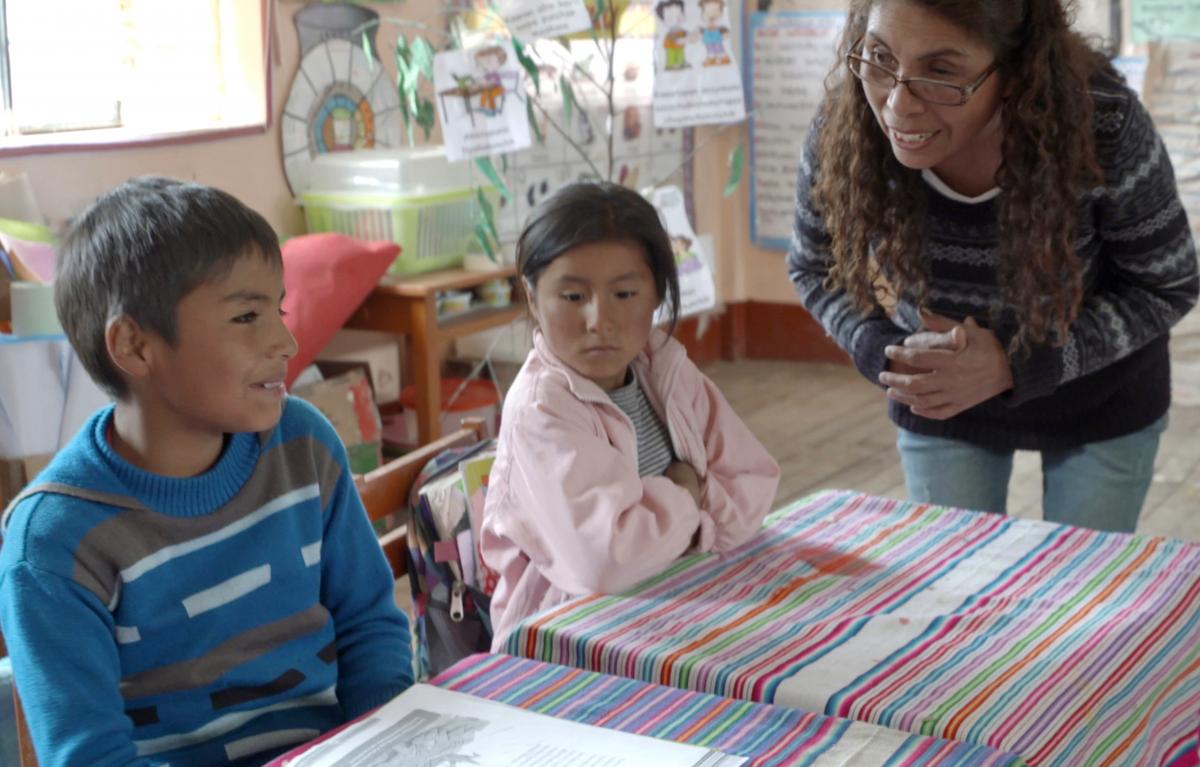A new report from CESR finds that despite Peru’s status as an upper middle-income country, quality education for the country’s Indigenous children is increasingly under threat, while the ability of cancer patients to access adequate and prompt treatment depends in large part on their economic and social status. The primary reasons for these rights failures can be found in the country’s unjust tax and budget policies.
 While twenty-first century Peru presents itself as a prosperous and resilient economy that has taken significant strides in reducing poverty and inequality, this is only half the story. Improvements in social outcomes have been limited in several dimensions, and are undermined by stubborn inequalities. As the economic expansion based on the commodities boom grinds to a halt, serious questions arise about the sustainability of the Peruvian economic model and the sufficiency of its investment in rights and services.
While twenty-first century Peru presents itself as a prosperous and resilient economy that has taken significant strides in reducing poverty and inequality, this is only half the story. Improvements in social outcomes have been limited in several dimensions, and are undermined by stubborn inequalities. As the economic expansion based on the commodities boom grinds to a halt, serious questions arise about the sustainability of the Peruvian economic model and the sufficiency of its investment in rights and services.CESR’s new report, Resources Restricting Rights: Fiscal Policy, Inequality and Social Rights in Peru, was undertaken in close collaboration with Peruvian organizations and researchers and explores how fiscal policy is profoundly impeding the enjoyment of social rights, as well as progress towards greater equality and sustainable development. Diving in depth into two policy areas – bilingual education for Indigenous communities and State responses to cancer – the study explores how inadequate resource mobilization stymies the scope and success of policies that are crucial for realizing the rights of marginalized populations and tackling disparities. The findings lay bare the human impacts of resource restrictions and regressive fiscal policies; for example, the Indigenous children whose disadvantages are compounded by the failure to provide them with quality intercultural education; and the cancer patients whose chances of survival are determined in large part by their income or geographic location. The report also outlines a range of positive steps that the State could take to remedy these disparities and funding gaps, including a range of much-needed fiscal reforms. Please read the English executive summary here.
As the report (and a powerful accompanying video) persuasively shows, the persistence of high levels of inequality in Peru is not an unfortunate coincidence, but is largely due to the absence of fiscal policies that would allow for adequate and equitable financing of programs crucial to the guarantee of social rights. For example:
• Peru has one of the lowest tax revenue collection rates in Latin America – and relatedly, one of the lowest investments in social policies;
• The country has a broad swath of tax exemptions and incentives which mostly benefit corporations and wealthy individuals, and has been extremely weak in combatting tax avoidance and evasion;
• Indeed, the amount of resources lost to income tax evasion is higher than total public spending on education; while with the resources the State loses by granting tax incentives, the budget for the cancer attention program could be multiplied by 12.
The report is particularly timely for a number of reasons. Building on CESR’s years of work on fiscal policy and human rights in various global and national spaces, the study contributes evidence and analysis to the growing conversation on the role tax policy should play in reducing socioeconomic inequality and guaranteeing human rights. Indeed, it comes at a time when the injustices of fiscal policy have topped the agendas of social movements now roiling in the streets of Latin American cities and far beyond. Four years into the much-heralded 2030 Agenda, the report also starkly illustrates the challenges that even middle-income countries face realizing rights and achieving the Sustainable Development Goals, without structural, progressive reforms to fiscal policy. And for Peru in particular, the report arrives at a critical juncture in the nation’s history and democracy, when global economic conditions as well as social and political forces at home in the context of the forthcoming elections are demanding a significant recalibration of the country’s economic model. Resources Restricting Rights charts a different path forward, envisaging policy alternatives that could provide solutions to the challenges the country and the region are facing.
Resources Restricting Rights expands CESR’s recent body of work in the Andean Region, as well as providing a country-level application of our groundbreaking OPERA framework for assessing achievement of economic and social rights. The report places particular emphasis on how fiscal policy affects women, Indigenous peoples, and other marginalized groups with whom CESR has been working collaboratively to build a more inclusive fiscal agenda for the region. It illustrates and compounds our conviction that, far from being a purely technical matter, fiscal policy is of crucial relevance to social justice and human rights – and has concrete impacts on human lives and opportunities.
The full report and accompanying video is currently only available in Spanish, but an English executive summary is also available.
Image courtesy of Carlos Cárdenas.
Related: